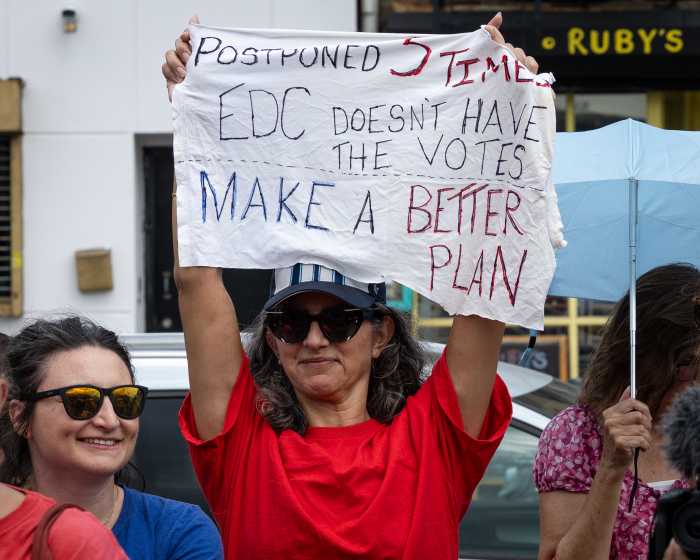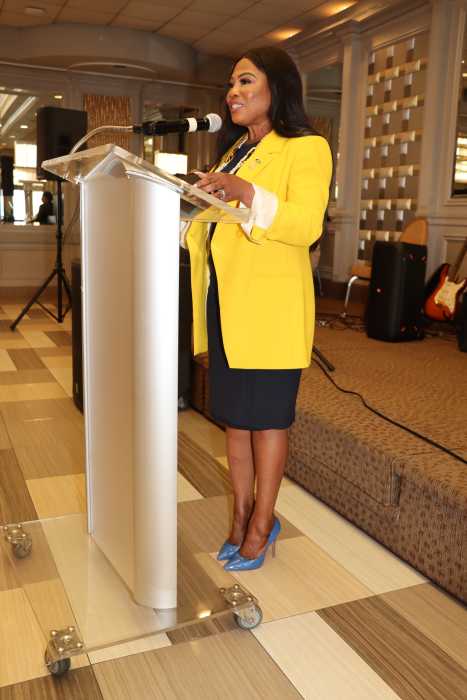A year and a half after Democrat Christine Quinn won the support of 40 of her 50 City Council colleagues in overriding Republican Mayor Michael Bloomberg’s veto of the Equal Benefits Law, the new speaker stood before reporters Tuesday vowing to keep fighting for the legislation, despite the fact that the measure had been overturned by the state’s highest court.
The EBL would require all contractors doing more than $100,000 in business with the city annually to offer their gay and lesbian employees domestic partner benefits identical to the spousal benefits already offered.
The measure was overturned by the Court of Appeals on a 4-3 vote, with the state’s ranking jurist, Chief Judge Judith Kaye, siding with the minority.
“This is obviously a setback for us,” Quinn said. “Even though we are disappointed in the ruling, we’re here today most importantly to make clear that our efforts to make sure the Equal Benefits Bill turns into the Equal Benefits Law… that those efforts are not over.”
The Court of Appeals ruling was the final stage in a process that began early last year when the Council went to court seeking to have the mayor ordered to implement the law which he said he would not enforce. The high court went beyond simply responding to the Council’s petition in finding that the mayor’s objections to the law are valid. The speaker explained that the Council is contemplating two courses of action—pressing the Court of Appeals for a re-hearing and/or going to the state Legislature “to clarify the Council’s powers as it relates to the contracting process.”
The court rejected the law on two broad grounds—first, that it conflicts with state requirements that public contracts be awarded to the lowest cost bidder and, second, that it runs afoul of federal government regulation of employee benefit programs embodied in the U.S. Employee Retirement Income Security Act, or ERISA.
Quinn said that the primary basis of the request for rehearing by the court would be the argument “that there were misapprehensions made on legal issues by the court”—namely, that in finding that the EBL doesn’t reward the lowest contract bidder, the Court failed to consider evidence in the Council’s legislative history that the measure would produce “net savings” for the city in terms of providing insurance to New Yorkers who might otherwise be forced to rely on the city to cover their health care costs.
“We didn’t just say this,” Quinn noted. “The city comptroller agreed with us in filing papers in support of our bill and our case. The state controller filed papers in support.” At Council hearings, finance staff from the city of San Francisco, which has had a similar law for years, testified that net savings to the public were achieved there.
Brad Smith, an attorney at Sullivan & Cromwell, which is providing pro bono assistance to the Council on the EBL, asserted that the court failed to investigate or even require evidence of Bloomberg’s contention that the law is contrary to state low-bid requirements.
“There is a presumption that laws are valid,” he said. “That can only be overcome by proof beyond a reasonable doubt. The court had the benefit of no factual finding. The only thing before it was [the Council’s] petition.”
Smith said the Council would welcome a hearing on the evidence, at which he believes effective arguments on the federal ERISA issue can be made as well.
The Council would need the support of four judges on the Court of Appeals to gain a re-hearing, which means that at least one who ruled against the EBL would have to agree to a second look. Smith conceded that such re-hearings are rare.
Should a re-hearing be rejected, the Council could seek action from the Legislature, though Albany could only address the issue of state contracting requirements, not the federal ERISA question. Smith said that if state law changes enabled the Council to reformulate the EBL, the ERISA question would probably be re-litigated, at the federal level if necessary.
The Empire State Pride Agenda, the state gay rights lobby that had made the EBL a top priority in recent years, issued a statement consistent with the Council’s aim to keep the effort for the measure alive, framing the Court of Appeals ruling in technical terms.
“New York City is underwriting discrimination,” read the statement from Alan Van Capelle, the group’s executive director. “Today’s ruling does not say that this practice is not happening or render any opinion about whether it is right or wrong. It just says the Equal Benefits Bill is not the mechanism to correct it.”
In contrast, the Log Cabin Republicans chapter here focused on the obligations Bloomberg’s victory at the Court of Appeals imposes on him in terms of addressing the underlying issue of partner benefits. In a written statement, the group noted not only that the mayor had prevailed on five insurance companies to offer domestic partnership insurance plans to small companies who previously were unable to access such coverage, but also that he issued Executive Order 72 last September requiring all city contractors to report what, if any, domestic partner benefits they offer.
“The administration must ensure that those vendors who hold lucrative city contracts indeed do the right thing for their gay and lesbian employees by offering them domestic partnership benefits,” said Chris Taylor, president of the New York City LCR chapter. “We trust that the Bloomberg administration will follow through on its stated commitment to pursue ‘enduring equality for all New Yorkers through lawful means’ and have discussions with those city contractors who continue to operate in an unfair manner.”
Taylor continued, on a related matter, “We also urge the Bloomberg administration to support legislation in Washington and Albany to ensure that domestic partnership benefits are not subject to discriminatory taxation, as they currently are.”
Anthony Crowell, special counsel to the mayor, underscored to Gay City News that Bloomberg’s personal jawboning had added a fifth insurer, Oxford, to the list of four companies introducing domestic partner benefits to employers with 50 or less workers. Crowell said that the availability of such coverage, which should be fully in place by July, is being communicated to city contractors and that formal questionnaires to each of them will be mailed out in March. It is too early to assess whether any contractors have yet changed their benefits policy, he said, but their compliance with the requirement to report on whether they offer domestic partner benefits would be enforced when renewals come due.
At Tuesday’s press conference, Quinn was joined by Upper Manhattan Councilman Robert Jackson, who chaired the Contracts Committee when it gave preliminary approval to the EBL back in 2003, and Leslie Thrope, whose long time partner Dominique Ghossein died of cancer after a three-and-a half-year illness during which Thrope was unable to get domestic partner health care benefits to assist her. At that time, Thrope worked for the SEIU Local 32B-J Legal Fund, a city contractor, who refused to recognize her family in the provision of employee benefits.
“It’s a sad day when you find out that you live in a country, and that is inclusive of New York City, that has many backward notions, laws,” Thrope told Gay City News. “To be able to use some procurement issue or some legal aspect of the law to say it’s okay to discriminate against people makes it hard for us who are just trying to live our lives and protect ourselves and be able to move forward and form our relationships.”
Jackson noted that the EBL had been dubbed Dominique’s Law in honor of the struggle Ghossein, Thrope, and their young daughter shared.
gaycitynews.com


































